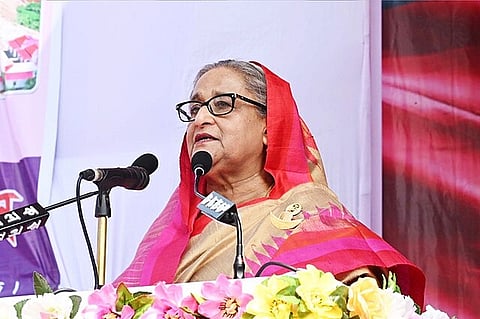

A nationwide lockdown called by ousted Prime Minister Sheikh Hasina's party severely disrupted Bangladesh on Thursday, escalating tensions ahead of a historic verdict in her crimes against humanity trial related to a deadly crackdown on protesters.
Bangladesh's capital, Dhaka, was brought to an uneasy standstill as the Awami League enforced a 'Dhaka Lockdown' to protest the trial. Streets that normally teem with traffic were quiet, with significantly fewer commuters at metro rail stations. Many schools and universities suspended in-person classes, shifting to online lectures out of safety concerns. The lockdown was marked by incidents of violence; crude bomb explosions were reported, and vehicles, including a train and a bus in Dhaka, were set on fire. The central office of the Awami League in the capital was also set on fire. Transport owners, fearing losses, kept their vehicles off the roads. Law enforcement agencies, including police and the Border Guard Bangladesh, were heavily deployed across Dhaka and other parts of the country to prevent further violence.
The unrest surrounds the International Crimes Tribunal-1, which announced it will deliver its verdict on November 17, 2025, against Hasina and two of her former top aides. The charges stem from the government's violent suppression of student-led protests in July and August 2024, which international observers described as "one of the deadliest civilian crackdowns" in Bangladesh's recent history. The tribunal is trying Hasina in absentia on five counts of crimes against humanity, including charges of orchestrating mass killings, using helicopters and drones to fire on civilian crowds, and the incineration of bodies to destroy evidence. The chief prosecutor has argued for the death penalty for Hasina and the former Home Minister. In a separate proceeding, Hasina was also convicted of contempt of court and sentenced to six months' imprisonment in absentia.
The Awami League has condemned the tribunal as a "kangaroo court" and a politically motivated "judicial mockery". The party's joint secretary stated the lockdown was a protest against a "farcical process" and claimed it was successful due to nationwide solidarity. In response to the verdict date, the party has announced a four-day program of nationwide demonstrations, culminating in a complete country-wide shutdown on November 16 and 17. The party has also called for the resignation of Bangladesh’s Interim Head, Muhammad Yunus, and the dissolution of the tribunal. Dozens of Awami League activists were reportedly arrested across the country after they tried to bring out processions.
The trial has drawn international attention, with United Nations human rights observers expressing cautious support for judicial accountability while also urging impartiality. Lawyers for Hasina have filed an Urgent Appeal with UN Special Rapporteurs, raising serious concerns about the lack of fair trial rights and due process, noting she is being tried in absentia by a tribunal they argue lacks independence. The appeal states that any death sentence following what they call a "manifestly unfair trial" would amount to a summary execution. Domestically, the verdict and the ongoing political strife set the stage for more turbulence as the interim government of Nobel laureate Muhammad Yunus pledges to hold elections by February 2026, elections from which the Awami League is currently banned.